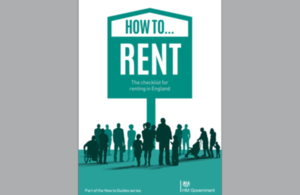Savvy students know their renting rights
Students returning to university this autumn and renting a home for the first time don’t have to put up with rogue landlords, thanks to government rules.

- University students can demand better in the private rented sector
- Deposits must be protected in a government-backed scheme
- Landlords must put problems right quickly – or students can complain
When things go wrong with rented properties, students have the right to get them fixed – and the government has published How To Rent guides to help out.
Government legislation protects students and their money from rogue landlords and agents. And new laws coming into force on 1 October, around the time when a new term starts, will mean landlords must provide adequate size bedrooms and sufficient rubbish bins.
Six things students should know on move-in day:
- Your deposit must be protected in a government-backed scheme – get a certificate from your landlord or agent.
- Check the property is safe – think fire, electrical, gas safety certificate, and hygiene. If you have concerns, raise them with your landlord or agent immediately.
- Agree an inventory with your landlord or agent – or you could lose money when you move out.
- By law, landlords must install a smoke alarm on each floor (and carbon monoxide alarms if needed) but it’s your job to regularly check they are working.
- Know who is responsible for bills (water, electricity, gas) and take meter readings.
- Landlords or agents must be reachable to fix problems quickly – make sure you have their contact details.
Minister for Housing and Homelessness Heather Wheeler MP said:
Rogue landlords and agents should never get in the way of students enjoying university life and we’re working to stop them in their tracks.
We’ve brought in laws to crack down on bad operators and we have measures in place to protect tenants’ deposits.
We are going even further by changing the law to ban unfair letting fees and cap tenancy deposits.
We want students to know their rights – that landlords must do their job and fix leaks, keep heating working and install smoke alarms.
Landlords or agents must deal with any problems with the water, electricity and gas supply, and maintain appliances and furniture they have supplied. Councils can step in when landlords don’t do their job, and there are independent schemes to help resolve disputes with letting agents.
Houses lived in by 5 or more independent people will soon have to be licensed in an extension of laws which previously only covered buildings of 3 storeys or more.
Homes of any number of storeys will be covered under the extension, meaning more students will be helped – with tiny bedrooms (of less than 6.51 square metres for one adult) banned and landlords forced to provide the right bins to homes.
The laws will come in from 1st October but local authorities can give landlords up to 18 months to get bedroom sizes right.
As well as this, new regulations taking effect from 1st April 2019 will keep renters’ money safe by only allowing letting agents that join a government-approved client money protection scheme to handle their money.
Students should use the How to rent and How to rent a safe home checklists on Gov.uk.
Office address and general enquiries
2 Marsham StreetLondon
SW1P 4DF
Contact form https://www.gov.uk/gui...
General enquiries: please use this number if you are a member of the public 030 3444 0000
If your enquiry is related to COVID-19 please check our guidance page first before you contact us - https://www.gov.uk/guidance/coronavirus-covid-19-guidance-for-local-government.
If you still need to contact us please use the contact form above to get in touch, because of coronavirus (COVID-19). If you send it by post it will not receive a reply within normal timescale.
Media enquiries
Email newsdesk@communities.gov.uk
Please use this number if you are a journalist wishing to speak to Press Office 0303 444 1209
Social media - MHCLG
Twitter - https://twitter.com/mhclg
Flickr - http://www.flickr.com/photos/mhclg
LinkedIn - http://www.linkedin.com/company/mhclg